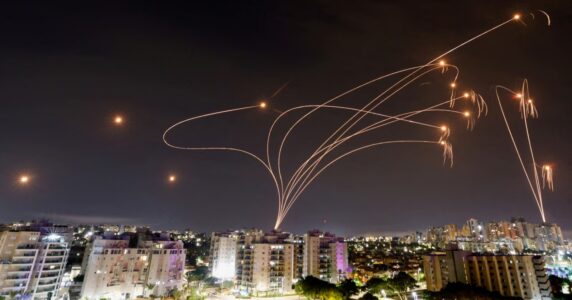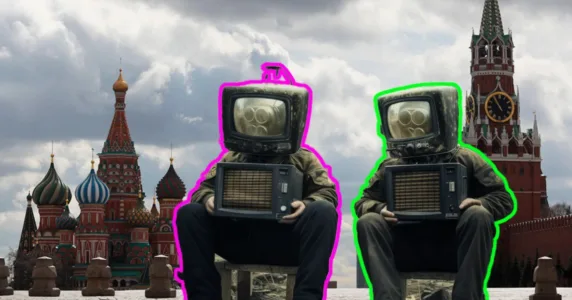Navigation and useful materials
Russia has abandoned its friend Medvedchuk, and Austria did not buy the Kremlin’s “gas Anschluss.” The Centre for Strategic Communication and Information Security has collected the main fakes and narratives of the Russian propaganda of April 27.
- Cobasna as the Pandora box of Transnistria
- The wide variety of Moscow “provocations”
- Tear and fear of the occupiers in Kherson.
- The referendum fever of propaganda mouthpieces
- Russian “cockroaches” need Ukrainian blood
- The Kremlin failed the “gas Anschluss” of Austria
- Putin couldn’t care less about Medvedchuk
Cobasna as the Pandora box of Transnistria
Early on April 27, a specific case appeared in the Transnistrian can of worms gradually opened up by Russia — Cobasna. This is a small town located near the border with Ukraine. Cobasna is interesting only due to the ammunition depot — “the largest one in Europe,” according to propagandists. If seized, they say, Ukraine will be able to fight for ten years.
Therefore, following spam attacks on the local population, the Russian propaganda proceeded to something bigger. Ukrainian saboteurs and drones immediately appeared in and above Cobasna.
IN FACT, these warehouses are 73 years old. The last time they were replenished was during the withdrawal of Soviet troops from the territory of the former “people’s democracies”: GDR, Poland, Czechoslovakia and Hungary.
All this “Soviet” junk is guarded by the Russian troops who have been here for thirty years now. “Transnistria” itself, many believe, was established to preserve this rubbish. And it lived on in its Soviet capsule this entire time. The only means of survival has been smuggling.
And the political pundits from the Kremlin suddenly decided that Ukraine has so little weaponry (despite the regular and increasing supply of contemporary weapons from the West) that it cannot handle the war without the ancient Cobasna warehouse.
The wide variety of Moscow “provocations”
The story involving the useless depot from the little-known “Transnistria” is also an interesting example of double standards in the Kremlin’s rhetoric. OPU adviser Oleksii Arestovych said in a hypothetical manner that “Moldova is our closest neighbour, whose fate we certainly care about. We have always stood, stand, and will stand with the people of Moldova. That is why Moldova can turn to us for help,” — and Putin’s spokesman Peskov immediately called this statement “provocative.”
Interestingly, when United Russia officially asked the leadership of Russia to supply weapons to the self-proclaimed “DPR” and “LPR,” Peskov did not see anything provocative about that. (Unofficially this was, of course, far from the first supply.)
And if Moldova, which is officially recognized all over the world, for example, officially seeks help from Ukraine, which is officially recognized worldwide, it would be a “provocation.”
IN FACT, Moldova made a major misstep (according to the Kremlin) when its president, Maia Sandu, signed a law on April 19 banning the black and orange striped ribbon and the symbols Z and V in the country.
“We cannot allow the use of symbols in our country that represent or support the Russian invasion of Ukraine. Symbols change meaning depending on events, and they no longer have anything to do with the war that took place 77 years ago. They are about today’s war in Ukraine,” Sandu said, emphasizing that “those who do not condemn the war may demand the killing of Moldovans tomorrow or even today.“
Kremlin propaganda immediately commented that “Chisinau was forced to take this step, trying to maintain the remnants of neutrality under pressure from the United States, the entire Western bloc and Ukraine.”
So, Moldova should stay vigilant. As should Kyrgyzstan, where Z symbols are already officially prohibited.
And this whole story will continue for as long as Russian media keep using outdated names, such as “Moldavia” instead of “Moldova,” “Kyrgyzia” instead of “Kyrgyzstan,” and “Bielorussia” instead of “Belarus.” Putin and his equally insane colleagues are yet to get over the USSR.
Tear and fear of the occupiers in Kherson
One example is the temporarily occupied Ukrainian Kherson. On April 27, a so-called referendum on the establishment of yet another “people’s republic was supposed to be held there. But it seems that the local population, “poisoned by the Nazi propaganda,” is not ready to take part in any referendums yet. There is no referendum yet, and protest rallies are already taking place. It is curious to see the number of protesters, according to Russian propagandists. Some indicated 15 people, others 150.
“But a hundred thousand are sitting, watching Russian news. They think how life will turn out. It will be fine,” Zakhar Prilepin wrote.
IN FACT, nothing is going fine for the occupiers. After they forcibly dispersed a peaceful rally, four people were injured. Among them are a 71-year-old woman with chest burns and a ruptured lung and a 50-year-old man with a broken leg. The age of the victims clearly indicates that Kherson residents have no nostalgia for the USSR. Why? The question is not even rhetorical.
In addition, if 15, or even 150 people, are dispersed using tear gas and flash-bang grenades, it means that the occupiers are scared. Simply scared. Only those who are afraid can try to make other people feel the same.
The referendum fever of propaganda mouthpieces
But the referendum in Kherson is still very much needed. At least to create a TV picture for Putin. After all, there are no other “wins.” And May 9 is creeping closer. Military exercises have already started. But even rehearse “referendum” is failing. Military journalist Andrii Tsaplienko has published a screenshot of correspondence between Kherson residents.
IN FACT, as Kherson political and economic scientist Volodymyr Molchanov explained to Suspilne, “They have no electoral commissions, polling stations, no lists. The only thing they can do is put a box somewhere on the central square and film a picture, maybe with those who come to receive humanitarian aid, or maybe with actors from Crimea.” According to him, this will not impress even Russians, as they seek to seize Ukraine without “referendums”. So, there is hardly any hope for the referendum as of now.
Russian “cockroaches” need Ukrainian blood
Another tear-jerking story about how propagandists are trying to explain to Russian viewers what the Russian army is actually doing in Ukraine.
One of them was getting so confused that he actually said the following: “The war is a genocide of Russians because they attacked Ukraine and are now dying there, and it is the West’s fault, because Russians and Ukrainians are the same people.” At the end of his speech, the propagandist equated the Russians with cockroaches (!).
These cockroaches should be saved with blood, which, according to Russian State Duma members, Ukrainian prisoners of war must donate to the Russian occupiers.
IN FACT, “this practice of forcible blood donation was widespread in the Nazi concentration camps… Russia is blatantly violating Article 26 of the Geneva Convention on Treatment of Prisoners of War” — commented Ukraine’s Parliament Commissioner on Human Rights Liudmyla Denisova.
For example, in the Nazi concentration camp in Salaspils, established in occupied Latvia in 1941, according to some estimates, more than 3.5 thousand litres of children’s blood were taken over three years.
The Kremlin failed the “gas Anschluss” of Austria
IN FACT, even chancellor of Austria himself Karl Nehammer refuted this fake from his personal smartphone: “OMV will continue to pay for gas in Euro. Austria strictly adheres to the jointly coordinated EU sanctions,” he wrote.
Putin couldn’t care less about Medvedchuk
And finally, let’s mention Viktor Medvedchuk, who was “Russia’s man” for so long that he started believing it himself. On April 27, it came to light that American Trevor Reed, who was once sentenced to 9 years in Russia for a drunken domestic fight with police, was exchanged for a Russian pilot Konstantin Yaroshenko. He was arrested in 2010 in Liberia on charges of plotting to transport a large consignment of cocaine. The drug courier was later deported to the United States, where he was sentenced to 20 years in prison in September 2011. In fact, when Reed was convicted in Russia, it was already clear that this was a hostage for exchange. But what kind of exchange?

Turned out, that courier Yaroshenko is more important for Putin than his actual family Medvedchuk. And this is all they need to know. Not just Medvedchuk or his wife Oksana Marchenko, but also Kherson collaborators Vladimir Saldo and Alexander Kobets. Unlike Medvedchuk, Putin does not even know their last names.
If you have found a spelling error, please, notify us by selecting that text and pressing Ctrl+Enter.



